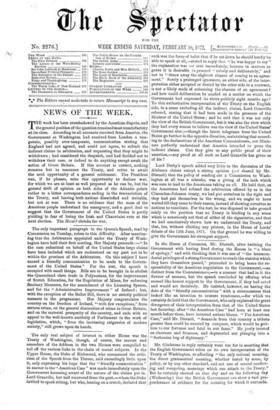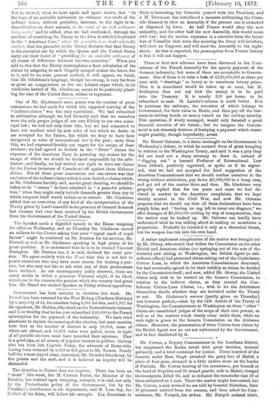Mr. Gladstone in reply certainly went too far in asserting
that the English Government relies on its own interpretation of the Treaty of Washington, as affording " the only rational meaning, the direct grammatical meaning, whether tested by sense, by policy, or by any other standard, and not one of several conflict- .ing and competing meanings which can attach to the Treaty." But he certainly showed on that day and on the following day (Wednesday) that the British Government can show a vast pre- ponderance of evidence for the meaning for which it contends. For he showed, what we have again and again shown, that " in the hope of an amicable settlement no estimate was made of the indirect losses, without prejudice, however, to the right to in- demnification on their account, in the event of no such settlement being made," and he added, what we had overlooked, through the accident of consulting the Treaty in the form in which it is printed in the " American Case," where the preamble is no doubt advisedly omitted, that the preamble to the Treaty declares that that Treaty is the executive act by which the Queen and the United States carry out their desire of "providing fin• an amicable settlement of all causes of difference between the two countries." When you add to this that the Treaty contemplates a final calculation of the claims by assigning to each illegally escaped cruiser the losses due to it, and by no more general method, it will appear,"we think, that Mr. Gladstone's langUage, though too strong, is very far from so great an exaggeration as the one Liberal organ which, in, its vindictive hatred of Mr. Gladsto ne, seems to be positively plead- ing the case of the United States, wishes to represent.



































 Previous page
Previous page